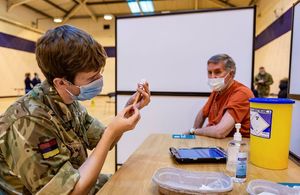PM address at the COP26 Action and Solidarity session: 1 November 2021
Thank you everybody and welcome to this session on action and solidarity.
I’m going to kick off with giving you my perspective because this is about all of us taking the concrete steps that will actually help the countries around the world that need it most.
When it comes to tackling climate change, words without action, without deeds are absolutely pointless.
And our record on deeds so far is not exactly stellar – we had a brilliant speech from Mia Mottley of Barbados making the point.
Back in Paris, richer nations all signed the paper saying that by 2020 we’d be raising $100 billion of climate finance each year and there was no ambiguity, no wiggle room in that.
But that deadline has come and gone and yet it’s going to be 2023 before we hit the target.
So, that was one of our very first post-Paris tests and we’ve collectively flunked it.
But of course getting there eventually is better than not getting there at all.
But if we are late again with the 1.5 or with the rest of the 1.5c challenge then we will have left it far too late.
And as anybody who was in that session at UNGA will remember, the testimony is of those that are on the front line, the countries that face cataclysmic inundations, the countries that face the hurricanes, they really will not forgive us.
They are looking at what’s happening at this COP, and we need to think about them and take action now to prevent loss and damage on a truly catastrophic scale. We’ve got to take action on their behalf.
So I’ve got to say to everybody who belongs to one of the richer and more developed nations, that as the host country for COP26 and with Alok on my right as the President of COP26…
…If I’m forced to choose between those who speak up and who have spoken up passionately for more support urgently because they need it in the most vulnerable countries in the world…
….if I’m forced to choose between them and countries like my own, I’m backing the first group – I’m backing the most vulnerable.
And I want you to know we have your back and we are going to support you.
Because that is the only way to make the change that we need, and I hope that in the course of the next two weeks, the contributor nations will tell their negotiators to stick to that objective and to get to the conclusion we want.
Finally, if anybody tries to row back on some of the commitments they have made and if we feel things aren’t going fast enough, then it’s a clear fact that I become Foreign Secretary nearly 6 years ago now, and in that time I’ve picked up a lot of mobile phone numbers which is stored in my iPhone…
…And I will not hesitate to use that privilege and get on to you and urge you to do more.
And if we’re going to make a success if the COP, if we’re going to deliver for the countries that need it If we’re going to tackle climate change then we must raise that finance and understand the position they’re in.
Thank you all very much.

